Quentin Tarantino, 60, has said that The Movie Critic will be his last directing effort because he doesn't want to succumb to a gradual decline period, which tends to happen, he believes, when directors get into their 60s. Yes, Alfred Hitchcock went into a slow decline after The Birds (Marnie is abundant proof of that) and Stanley Kubrick had arguably begun to lose his edge (certainly compared to the filmmaker he was in the '60s, '70s and '80s) when he made Eyes Wide Shut. But otherwise there are several holes in QT's analysis.
Login with Patreon to view this post
“Inside the ‘Blood Sport’ of Oscars Campaigns,” a N.Y. Times piece by Irina Aleksander, appeared this morning at 10:55 am.
It covers a realm that HE is deeply familiar with, but rather than post a sweeping assessment here are four or five stand-out portions of the article, and in most instances my reactions to same:
1. End of the 2nd paragraph: “The [Andrea Riseborough] campaign was described as organic and grass roots, but some celebrities had posted suspiciously identical language, describing “To Leslie” as “a small film with a giant heart.” That Viola Davis (The Woman King) and Danielle Deadwyler (Till) were not nominated despite predictions to the contrary made it look as if a bunch of actors campaigned on behalf of a white actress, leading to the exclusion of Black actresses.”
HE reaction: This is the same old “sore loser” response that Davis, Deadwyler and the directors of their films, Till‘s Chinonye Chukwu and The Woman King‘s Gina Prince-Bythewood, voiced in the wake of the Oscar nominatons.
From “Andrea Riseborough + Duelling Concepts of Meritocracy vs. Equity,” posted on 2.15.23: “In their minds they all got blanked by embedded white elitism or misogynoir or some other racist variant.
“In response Everything Everywhere All At Once‘s Michelle Yeoh, a Best Actress nominee, suggested that they should cool their jets and wait their turn.
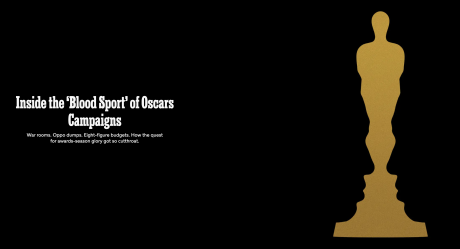
“Prince-Blythewood: ‘There is no groundswell from privileged people with enormous social capital to get behind Black women. There never has been.’ Deadwyler: ‘We’re talking about misogynoir. It comes in all kinds of ways. Whether it’s direct or indirect, it impacts who we are.’
“The essence of the lament seemed to be ‘we’re looking for some equity here and we haven’t received it…progressive Academy members know that the BIPOC narrative is about giving us the respect and adulation that is our due for the work but also in a payback sense, considering the decades upon decades of racist exclusion in this industry…we know we delivered first-rate work and yet we got shut out…some of you won’t say what happened but we can smell it in the wind…Andrea Riseborough‘s white supporters pushed her though but perhaps at our expense, or so it seems.”
2. Bottom of the third paragraph, also about the Riseborough campaign: “’I don’t believe academy members should be posting about how they’re going to vote,’ Oscar strategist Cynthia Swartz said, ‘or urging others to vote in a certain way.’ Tony Angellotti, a consultant on The Fabelmans, put it less mildly. ‘There are very specific rules about direct outreach…clearly, here, those rules were broken.’
“Neither To Leslie‘s director [Michael Morris] nor his wife [Mary McCormack] are members of the academy. But consultants I spoke to said it didn’t matter. A couple joked that it was a little like the Jan. 6 insurrection: President Donald Trump may not have personally stormed the Capitol, but he encouraged others to do so.”
HE reaction: Though smirk-worthy, offering an analogy between the Riseborough campaign and the Jan. 6th uprising is somewhere between absurd and slanderous, and it further establishes that the Times, a woke-minded, POC advocacy newspaper if there ever was one, strongly sympathizes with the sore losers.
3. Top of the ninth paragraph: “Negative narratives are usually attributed to the diabolical workings of rival strategists: the stories about abusive directors, overblown budgets, whether the real people behind biopics should really be celebrated. (See: A Beautiful Mind.) ‘They try to change someone else’s narrative by adding dirt to the layer,’ Angellotti told me, citing the old rumor that Matt Damon and Ben Affleck didn’t really write Good Will Hunting.”
HE reaction: I was involved in that Good Will Hunting rumor right up to my neck, and the rumor wasn’t as Angelotti describes — i.e., that Matt and Ben didn’t really write it. The rumor was that the late William Goldman has done a polish of their screenplay. Nobody was whispering Matt and Ben didn’t write it, only that Goldman spritzed it up. I was the one, in fact, who passed the rumor along to Goldman, and he in turn called the Good Will Hunting team and said, “Hey, this rumor is making the rounds…I just heard it from Jeff Wells.”
The Oscars have been withering on the vine for the last six or seven years due to woke politics and are pretty much all but toast, but in the view of the Los Angeles Times editorial board and an editorial they posted on 12.27, they’re not toasty enough.
“Let’s really stick a fork in this sad, dying annual celebration of movies,” a 12.27 LAT editorial essentially says. “Let’s urge AMPAS and the TV academy to kill gender-based acting Oscars in order to satisfy the political goals of the trans community and their progressive allies.”
Everyone understands that the lore of the Academy Awards telecast is all but finished. The viewing audience been shrinking over the last several years, especially among Millennial and Zoomers and double especially since the disastrous, pandemic-sieged Soderbergh Oscars of April 2021.
My heart is broken over this. I used to feel joyful during Oscar shows; now there’s almost nothing. James Stewart, Grace Kelly, Billy Wilder, Cary Grant, Ernest Borgnine, Bette Davis, Katharine Hepburn, William Wyler and William Holden are weeping in heaven and taking turns pounding the refrigerator door.
But in order to finalize the death process, the show needs one more kitchen knife shoved between the ribs, and the gender neutral acting initiative might just be the dagger point that does the job.
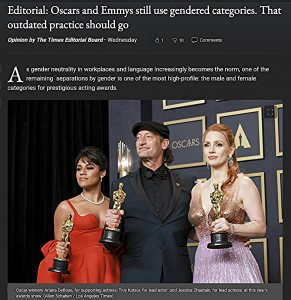
On 8.23.22 the Spirit Award honchos decided to abandon gender categories for acting awards, more or less following the lead of the Gotham Award guys. Two months later (on 10.12.22) a woke cabal within the Los Angeles Film Critics Association adopted the same policy, despite nearly half of LAFCA being opposed to gender neutral.
And now this L.A. Times editorial has gotten into the act.
I said this last August and I’ll say it again: “If the Academy decides to go gender-neutral with the Oscar acting awards, the eclipse will be total and absolute, and I mean beyond the level of anything dreamt of by Michelangelo Antonioni.
“In a populist cultural sense as well as aesthetically, the Oscars will have announced to the Joe and Jane Popcorn public that after six or seven years of fiddling around with secular woke passions and priorities, the Oscars are truly no longer about engaging even a semblance of a mass audience, or certainly in any way that seems to matter.
“Yes, Virginia, the Oscars are about wokesterism, secular industry politics and (this is key) elbowing older, insufficiently progressive white guys aside…about a tiny cabal of progressive fanatics who are determined to de-popularize not just the Oscars but movies themselves.
If AMPAS manages to eliminate gender-based acting awards, Average Joes and Janes will simply walk away and stay away…the more impassioned among them (i.e., the Oscar torch-bearers and sentimentalists) will raise their fists and voices and say “stop this insanity, stop this bullshit…outside the woke realm men are men and women are women, and they generate different moods and expressions and ways of living and processing the ups and downs of living…stop this bullshit and come down to earth.”
All hail the death of the great American art form called movies…right? All hail the political instruction that has overtaken a significant portion of mainstream movies and the casting process altogether. The Oscars were launched in the late ’20s and are now, 95 years later, on the verge of completely erasing themselves from mass public consciousness. All hail presentism!
And why? Several reasons and factors are behind this, but in today’s context it boils down to this: the non-binary trans community wants to strengthen its political influence and power. And to accomplish this goal, one of the most populist, mass-outreach, Joe and Jane Popcorn aspects of the Oscar telecast — gender-based acting categories, which have been with us for nearly a century and in fact for hundreds of years beforehand — has to be dissolved.
What the overwhelming majority of movie lovers might prefer is not important. The aims of a small activist minority is what counts.

An article in the January 2023 issue of Empire dishes about de-aging tech used for the still-untitled Indy 5 flick, which stars the 80 year-old Harrison Ford in the title role.
The slam-bam prelude opening is set in 1944 — six years after the events in Indiana Jones and the Last Crusade took place in 1938, and 13 years before the 1957 adventure that unfolded in Indiana Jones and the Kingdom of the Crystal Skull.
I’ve always understood that Jones was born sometime around 1900, and so Ford (roughly 38 or 39 during the shooting of Raiders of the Lost Ark) will be inhabiting the 44 year-old archeologist in the forthcoming James Mangold film (Disney, 6.30.23).
Are we clear so far? In Indy 5 Jones will start out as a 44 year-old, or roughly six years older than he was in Last Crusade, which took place in 1938 and was released in 1989, when Ford was 47. Even I’m a bit confused.
The Indy 5 prelude is set in an old castle and involves Nazi antagonists. A blend of old footage plus anti-aging tech was used to make Ford look 44, or roughly how he appeared in Witness (’85) and The Mosquito Coast (’86). Ford was born in 1942.
Ford to Empire: “This is the first time I’ve seen [de-aging technology] where I believe it. It’s a little spooky. I don’t think I even want to know how it works, but it works.”
After the opener, Indy 5‘s story will advance 25 years to 1969, when Jones is supposed to be roughly 69. So Ford will be playing ten years younger than his actual age, which shouldn’t be a problem.
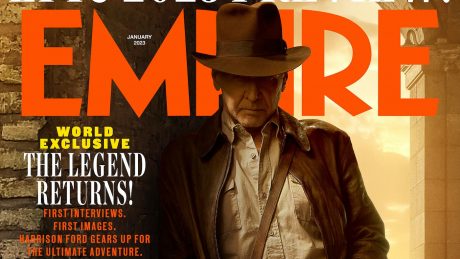
Speaking as a longtime honorary (i.e,. self-proclaimed) member of “the tribe”, I’m semi-astonished that within the community of decent, well-brought-up Americans (i.e., outside the realm of MAGA lunatics) that even a shred of anti-Semitism still circulates in the bloodstream of this nation.
Ken Burns‘ The U.S. and the Holocaust reminded that anti-Semitism was an unmistakable horror in the 1930s and ’40s, but haven’t we jettisoned all that, especially over the last 50 or 60 years? Among decent folk, I mean**?
Perhaps not. Or at least, apparently or allegedly, among a certain subset of Black Americans. Kanye West spit out some of the ugly not long ago, and was severely pounded and punished for it. Dave Chapelle spoke of the Kanye slapdown on SNL two nights ago, and David Poland spoke of tribal animus yesterday in his Substack Hot Button column (#255):
“I have never really understood how this thing between Blacks and Jews took such hold,” he wrote, [but] I am also aware, from living a long time, that many of my Black friends believe in a lot of false tropes about Jewish people, which is also true in reverse.
“My best friend in the world still makes a comment anytime I order pork of any kind. Jews are ‘them,’ meaning not only are we in the category of entitled white oppressors, but we are also hyper-entitled by perceptions of wealth, political prowess, and higher levels of education.”
I for one have never ordered a pork dish in my life — not once — although I’ve written more than once about one of the greatest compliments I’ve ever received in my life. In the late ’70s a smart and wise Jewish friend and fellow cineaste told me I had more Jewish guilt than he did. That was the beginning of my honorary Jewhood, which thrives to this day. I also regard myself an honorary gay guy, in a vaguely metrosexual sort of way.
I am grateful that my alleged or supposed honorary status among Jews and gays, however legit or illegit it may be, is at least a discussion point because it gives my life a certain dimension that would not otherwise exist.
Poland #1: “[Jews and Blacks] have been held down, exiled, slaughtered, and suffered attempts to remove what is uniquely [theirs] in the world. It is somewhat insane to compare atrocities, but personally, I believe the Black Holocaust of slavery is a step worse than the Jewish Holocaust that killed 6 million Jews because slavery not only killed and demeaned and tortured Blacks, it sought to homogenize away any cultural history away from them.”
Poland #2: “I guess it’s a little like having a friend you love who is abusive to women (short of violence) or who is a little bit racist. We all have them or have had them. And most of us know people of some small group that looks down on another small group without breaking the bar on what we believe makes them a racist. Once you become an adult, the world gets complicated. Dave Chappelle is complicated.”
I’ll make it simple — no one who aspires to even a semblance of honesty will claim that race consciousness doesn’t exist in every human. Race acknowledgement is what we all feel in our gut while racism is a judgment call — a suspicion that there may be something a little bit preferable about our tribe vs. the others. Everyone has muttered this to him or herself at one time or another, usually when young and ignorant due to the influence of under-developed people in our families or communities — “our thing seems a little better and perhaps is a little better, at least according to standards that we’re familiar with.”
I’m speaking of under-our-breath acknowledgments, of course. Nobody will say this stuff out loud. We all know how to adhere to what’s expected of us, and we all say the right things in order to get along, etc. The best of us understand the cosmic universality of everything, and act accordingly.
What I can’t stand about finger-pointing, holier-than-thou types like Poland (i.e,” Rabbi Dave”) is that they’re constantly sniffing the air for whiffs of people who may be “a little bit racist,” and who, once identified, need to be bitchsmacked and name-called and shoved around and so on. We’re all vaguely, subliminally conscious of racial separatism under the skin, but those us with even a smidgen of heart and soul dismiss those subliminals on a regular basis while summoning the better angels of our nature. That’s how things have always worked on my side of the court, at least.
** The Charlottesville primitives are not included in this category.
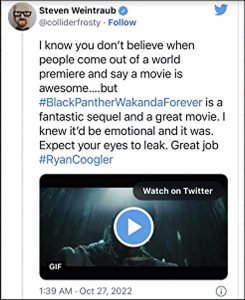
All hail the truth-telling, no-holds-barred, non-ass-kissing Scott Mantz…a movie-obsessed Colossus of Rhodes among men!
Mantz #1: “WAKANDA FOREVER isn’t as good as BLACK PANTHER (I mean, how could it be?), but even so, it’s still a mixed bag. The first half is slow, hard to follow and lacks focus, but it gets better as it goes [along], and the last 30 minutes are great with an emotional payoff.”
Mantz gave WAKANDA a B grade but we all know what that probably means, given the usual “let’s be polite since we were invited to the premiere” factor — it means C for “not bad but sorta kinda faintly blows except for the ending.”
Scott Mendelson, Forbes: “WAKANDA FOREVER entertains but spends way too much time setting up future MCU projects and coping with its non-fiction tragedy. It also often feels like a mix-and-match of prior (frankly inferior) Marvel movies. Works best when it’s just allowed to be Black Panther 2”
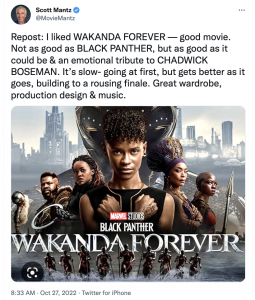
I’d like to ask the HE faithful a question, and while I understand that wokesters are incapable of actual honesty, I’d really appreciate honest answers from the East Berlin truth-tellers. Are you sincerely interested in hauling your blubbery asses down to a megaplex so you can immerse yourself in “a beautiful study of grief” that lasts 161 minutes?
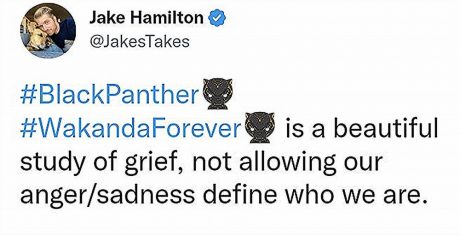

The only film I felt completely elevated by at the ’22 Telluride Film Festival was Sam Mendes‘ Empire of Light (Searchlight, 12.9). I was actually amazed that I fell for it as I was more than somewhat skeptical going in.
Empire is set roughly 42 years ago in rural England (it was shot in Margate) and is primarily about an unstable, somewhat schizzy movie theatre manager named Hilary Small (Olivia Colman, brilliant as always) and a brief, furtive affair she has with Stephen (Michael Ward), a theatre employee of color who’s exceptionally good looking and at least 20 years younger than Hilary.
Colin Firth is a crusty theatre owner who exploits Colman sexually, casually, off and on. But this eventually goes south, partly due to Stephen and partly due to Hilary going off her meds.
As I wrote on 8.24, I found it initially difficult to believe that Hilary-Stephen would happen in such a racially volatile period (I visited London in ’76 and ’80 and could absolutely smell the enraged skinhead vibes).
“However unbalanced and erratic, Colman’s character would have had to nurse a streak of serious self-destruction to engage in a May-December affair like this,” I wrote. And why, I added, “would a smart, good-looking dude like Stephen be interested in an unstable white lady on the far side of 45? What about all those foxy 20something girls running around town? I don’t get it.”
And yet the relationship gradually seems palatable and even endearing, and you start to realize as the film unfolds that Empire is about more than just Stephen-and-Hilary, an affair that doesn’t last all that long anyway. For it’s also a misty, memory-lane valentine to moviegoing and a golden, long-eclipsed era and, if you will, a certain kind of spirituality and way of life, even, for cinema devotees.

It dawned on me after seeing Empire that Mendes, born in ’65, had partly based it on his own hopes and dreams and movie-related experiences as a 15 year-old in 1980 and ’81, but that (and I’m guessing here) he decided the story would seem more au courant (i.e., woke) if Hilary’s lover wasn’t a pale-faced teenager but a 20something black dude, and from there he was off to the races.
Wokester critics have been shitting all over Empire of Light because of the Hilary-Stephen dynamic, which they certainly don’t approve of. They’re not buying the idea of even a brief sexual attraction between the two, and they resent the notion of an older, unstable, jagged-edge Hilary peering into Stephen’s soul and vice versa. White wokesters, after all, have been put on this earth to defend the dignity of POCs and to indict any white-male-created scenario that doesn’t say or do the right thing in their regard.
But Hilary and Stephen are both outsiders in a sense (Hilary of the temperamental variety and Stephen of a bruised and guarded shade due to white nationalist fervor) and that’s the basis for their mutual understanding. I bought it. It worked for me.
I realized within 15 minutes of the beginning that Empire of Light was an exquisitely composed yesteryear film, so perfectly acted and calibrated and moving. (I was especially blown away by Tanya Moodie‘s brief performance as Stephen’s mom.) The sorehead critics still have the upper hand, but once it starts showing around everything will change — trust me.
Empire is easily one of the best films of the year, and a just-posted review by Vanity Fair‘s Richard Lawson supports this view.
Empire of Light is “a humble little tale of human connection,” he writes. “[It’s] the director’s most delicate, a wistful short story about two people seized by circumstance who help one another find their way through life. It’s an achingly lovely film — the best Mendes has yet made.
“Whatever Mendes’s [personal] connection to the material, he’s made something humane and nourishing, a picture of rare thoughtfulness and decency.
“Viewed from some angles, the film looks rather strange: as Hilary loses her grip on her well being, Empire of Light takes on surprising new dimensions. It’s a shock to see the movie break its dreamy spell, as Colman suddenly turns the volume of her performance way up. Mendes’ calm and steady film stays upright throughout these jarring thrashes — and as Stephen is violently thrashed at — building toward a conclusion of staggering poignance.
“What remains [at the end] is a deep and refreshingly heart-on-its-sleeve compassion, a humbled and awed appreciation for the majesty of learning from another person.”
Matt Walsh to the recently voiced complaint by race hustler Lisa Bond that "white men have had 400 years to do something about racism", but haven't done zip:
Login with Patreon to view this post
Apparently Kenneth Branagh's Death on the Nile (20th Century, 2.11) is (a) fairly mediocre but (b) not bad enough to be regarded as an albatross around Branagh's neck. It won't get in the way of his Best Picture and Best Director Oscar campaigns, I mean.
Login with Patreon to view this post

If there’s no surrendering to a movie…if there’s no world to submit to and believe in…if there’s no belief in any “movie world” on the part of the filmmakers or the actors or the audience then what what the hell are we doing, man? Movies are always about slipping into a rabbit hole and swallowing the red pill and buying into whatever happens down below…the characters’ journey is our journey, and we’re all on it together. But if there’s no rabbit hole or journey or pill then why watch the damn thing?
If you’re willing to pay to sit through a film as smart and self-aware and cynically violent and relentlessly hollow as Matt Bettinelli-Olpin, Tyler Gillett and James Vanderbilt‘s Scream (Paramount, 1.14)…if all you care about is basically watching an “amusing” meta-satire of a slasher film that constantly steps back and assesses itself every couple of beats and says “okay, another time out so we can make fun of ourselves and our formulaic meta bullshit which isn’t as meta or bulshitty as it might seem at first because we’re acknowledging the meta bullshit each and every step of the way so guess what? You’re smart, you get it, and we get that you get it and you get that we get that you get it,” etc.
Just describing this narcotizing slasher satire is making me…okay, not exactly nauseous but certainly bored and listless all over again.
I saw Scream last night, and half the time I was daydreaming about how everything could be settled fairly quickly if David Arquette‘s “Dewey Riley” could somehow get hold of Tom Cruise‘s “Vincent,” the cartel assassin from Michael Mann‘s Collateral…let’s say Dewey somehow got hold of Vincent’s cell phone number 17 or 18 years ago and it’s still good, and he calls and Vincent picks up and Dewey says, “Vincent…whaddaya doin’? I need you, man…I need you to get your ass up to Woodsboro as soon as you can because fucking Ghostface is at it again, and you just need to step into this situation and drill this motherfucker in the chest three or four times…tight groups…and once more in the forehead for good measure. All he has is a knife, Vincent…he’s a sitting duck. Just take him out as a solid for me, bruh…waste his ass.”
I was with Vanderbilt and Guy Busick‘s script during the first few minutes…everyone will be. Ghostface calls the first victim, Jenna Ortega‘s “Tara Carpenter,” and before you know it they’re talking about horror films and Tara mentions that she’s a fan of elevated horror (The Babadook, It Follows, The Witch, Hereditary, Midsommar, The Lighthouse) and Ghostface says “isn’t that a little fancy-schmancy?” or words to that effect, and I was going “okay, I like this…the writers are acknowledging that Scream isn’t elevated but at the same time they’re honest enough to admit that there is a higher level of horror, so this is cool.”
But the meta thing quickly stops working, and by the half-hour mark you feel completely trapped.
There are two or three references to the fictional slasher movies called Stab (stands-ins for Scream), and you know what I was thinking of? A 1982 Meryl Streep-Roy Scheider movie that was originally called Stab before it was retitled as Stiil of the Night.
A friend sitting two or three rows behind to my right was going “aahh-hah-hah!” now and then…having a terrific old time. An hour or so later I emailed him and said, “I heard you laughing at that cold, cynical metaverse piece of shit. You’re too obliging, too generous. I liked it in the beginning but it very quickly begins to eat itself.”
Pally: “I thought it was LOL funny. Very much in the spirit of the franchise while winking at the whole thing. I had a good time.”
HE: “A movie that doesn’t respect death or pain or stab wounds, and in fact makes a cheap, cynical game out of all of it…a movie that doesn’t respect death doesn’t respect life. It’s a cheap, self-reflecting wank.”
Pally; “Exactly. I had a great time.”
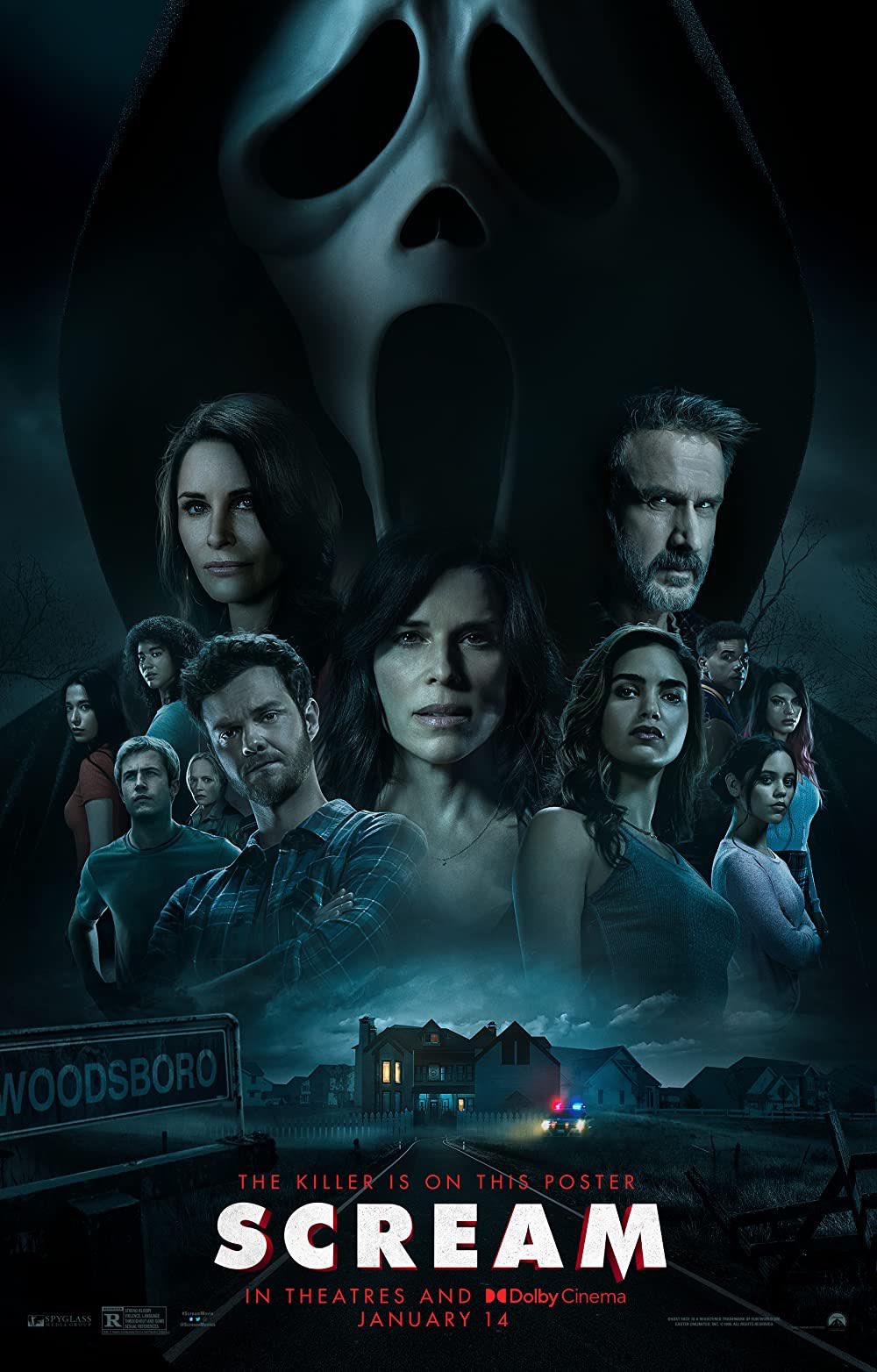
HE to Kino Video regarding upcoming Touch of Evil 4K Bluray (streeting on 2.22.22): As you guys presumably recall, England’s Masters of Cinema / Eureka Video released two versions of a Touch of Evil Bluray in two aspect ratios — 1.85 and 1.37 — roughly a decade ago.
A Kino Lorber spokesperson has confirmed that their forthcoming 4K version will be formatted only in 1.85.
In November 2011 Eureka Video released a Bluray of Orson Welles‘ Touch of Evil (1958) with five different versions of the film.
We’re actually talking three versions of the film, two of which are presented in both 1.37 and 1.85 aspect ratios and one (the 1958 pre-release version) presented in 1.85 only. The 1998 reconstructed version, running 112 minutes, that was put together by Walter Murch, Bob O’Neil and Bill Varney, is presented in 1.37 and 1.85.
Two aspect ratios for both versions is so hardcore, so film-nerdy…your heart goes out to people with this much devotion.
But the orange jacket-cover backdrop is, for me, a problem. To advertise a revered classic film taking place in a Mexican border town and shot in the gritty environs of Venice, California, Eureka chose one of the most needlessly intense and eye-sore-ish colors in the spectrum? A color that says traffic cones and prison jump suits?
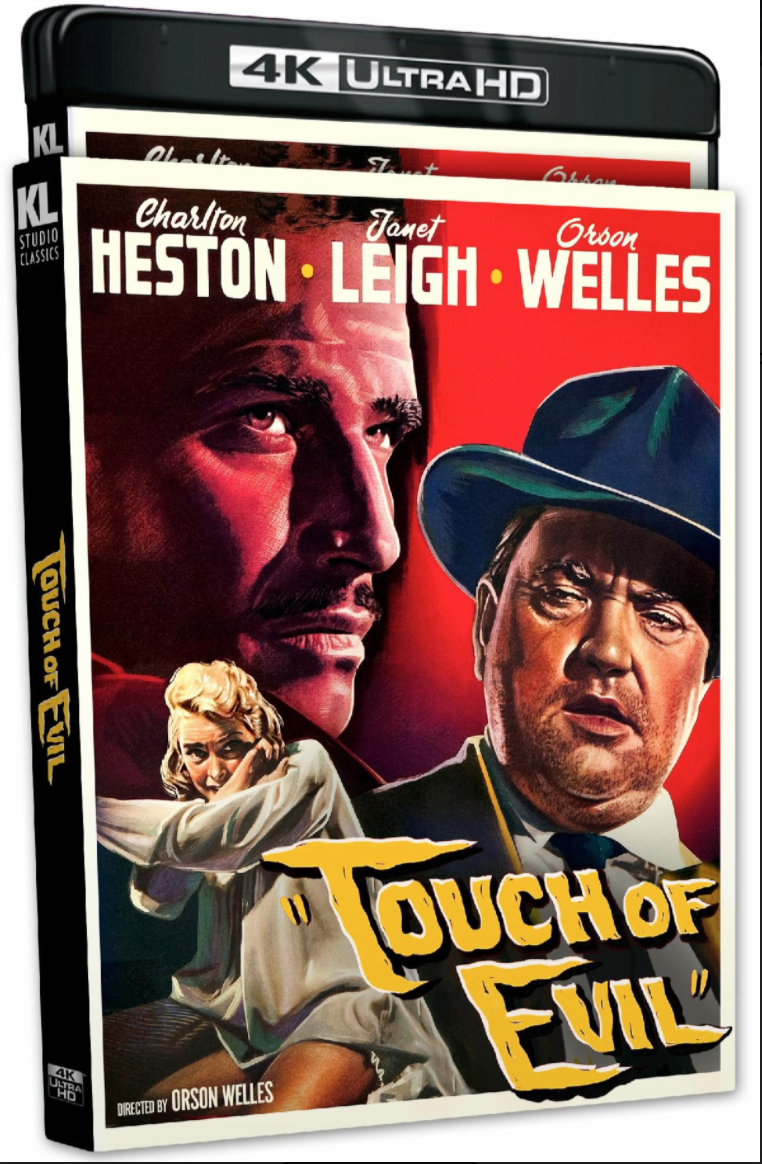
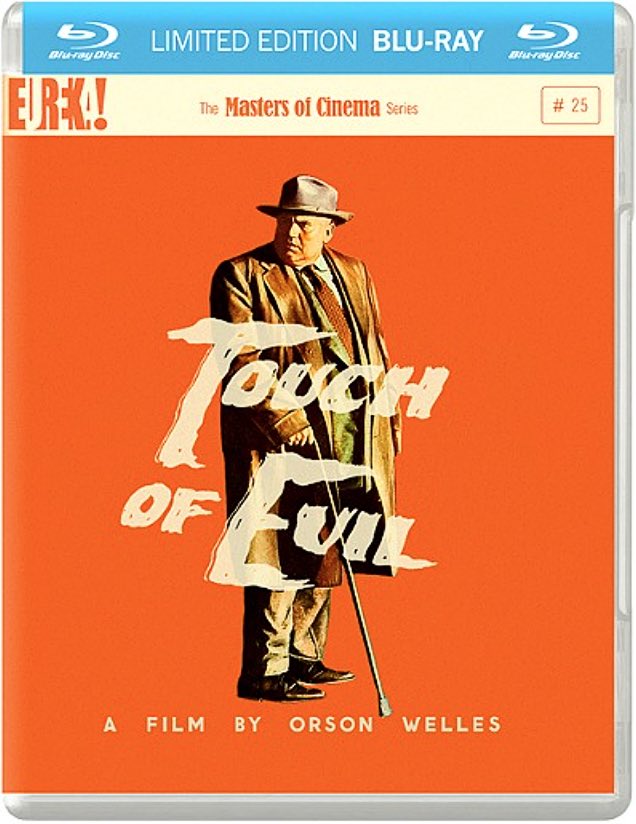
“‘When Douglas Sirk retired from American filmmaking and returned to Europe at the end of the 1950s, his reputation was that of a director who simply churned out glossy Hollywood weepies. But after a major critical reappraisal, spurred by the critics of Cahiers du Cinema, the German-born filmmaker was reclaimed as an auteur with a varied body of work, an eye for visual stylization, and a sophisticated understanding of Brechtian artifice, not to mention one of cinema’s greatest ironists.’
“So read a portion of a Film Society of Lincoln Center announcement about “Imitations of Life: The Films of Douglas Sirk” (1.23.15 thru 1.6.16), a comprehensive retrospective that “tracks Sirk’s artistry from his early German films through to his early Hollywood forays into multiple genres and on to the now-canonical works of his late career.”
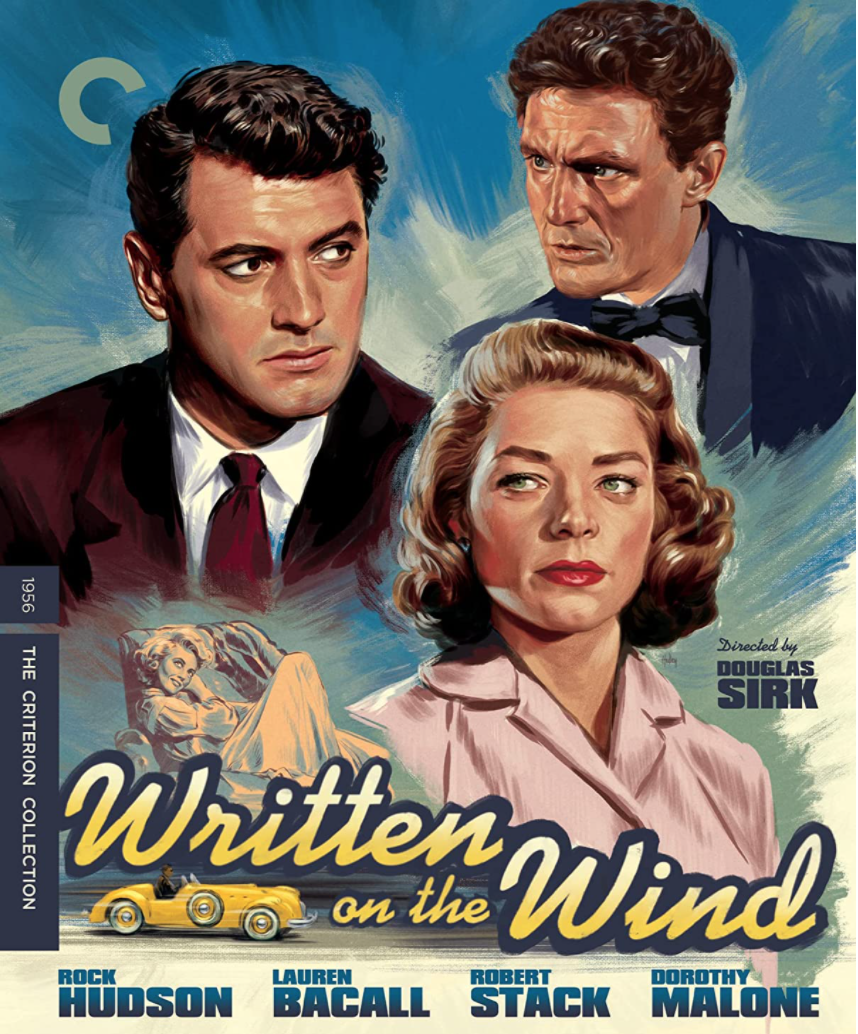
“Respectful Sirk Takedown,” posted on 2.22.10: “The German-born Douglas Sirk has long been considered a world-class, pantheon-level filmmaker. That’s because the film dweebs have been telling us for years that the dreadfully banal soap-opera acting, grandiose emotionalism and conservative suburban milieus in his films are all of an operatic pitch-perfect piece and are meant as ironic social criticism. (Or something like that.)
“The dweebs are playing an old snob game. They’re basically saying that you have to be a serious cineaste to recognize Sirk’s genius, and that if you don’t recognize it then you need to think things through because you’re just not as perceptive as you need to be.
There’s no winning against this mindset, which is somewhere between a schoolyard bully move and an intellectual con. The dweebs (and I’m talking about a very small and cloistered group of big-city critics) have put one over on us. And I’m suggesting, due respect, that the time has come to push back on Sirk and to consider him once again as the Guiding Light-level director that some (myself included) believe that he always was.
Sirk was mostly dismissed by critics of the ’50s and early ’60s for making films that were no more and no less than what they seemed to be — i.e., emotionally dreary, visually lush melodramas about repressed women suffering greatly through crises of the heart as they struggled to maintain tidy, ultra-proper appearances.
In his praise of Written on the Wind, Roger Ebert wrote that “to appreciate [this film] probably takes more sophistication than to understand one of Ingmar Bergman‘s masterpieces, because Bergman’s themes are visible and underlined, while with Sirk the style conceals the message.”
Aaaah, the old concealment game! John Ford used to do this also, but you can watch Ford’s films, or at least savor what’s good about them (despite the Irish sentimentality). If Ebert’s comment isn’t Orwellian film-dweeb speak, I don’t know what would be.
Criterion’s Written on the Wind Bluray pops on 2.1.22.


 All Hail Tom White, Taciturn Hero of “Killers of the Flower Moon”
All Hail Tom White, Taciturn Hero of “Killers of the Flower Moon”Roughly two months ago a very early draft of Eric Roth‘s screenplay for Killers of the Flower Moon (dated 2.20.17,...
More » Dead-End Insanity of “Nomadland”
Dead-End Insanity of “Nomadland”Frances McDormand‘s Fern was strong but mule-stubborn and at the end of the day self-destructive, and this stunted psychology led...
More » Mia Farrow’s Best Performances?
Mia Farrow’s Best Performances?Can’t decide which performance is better, although I’ve always leaned toward Tina Vitale, her cynical New Jersey moll behind the...
More »

 Hedren’s 94th
Hedren’s 94thTwo days ago (1.19) a Facebook tribute congratulated Tippi Hedren for having reached her 94th year (blow out the candles!)...
More » Criminal Protagonists
Criminal ProtagonistsA friend suggested a list of the Ten Best American Crime Flicks of the ‘70s. By which he meant films...
More » “‘Moby-Dick’ on Horseback”
“‘Moby-Dick’ on Horseback”I’ve never been able to give myself over to Sam Peckinpah’s Major Dundee, a 1965 Civil War–era western, and I’ve...
More »


